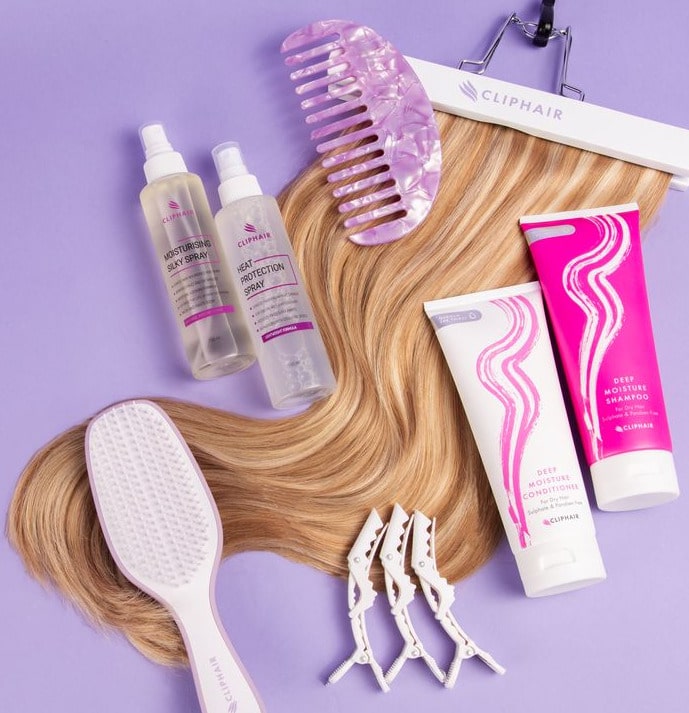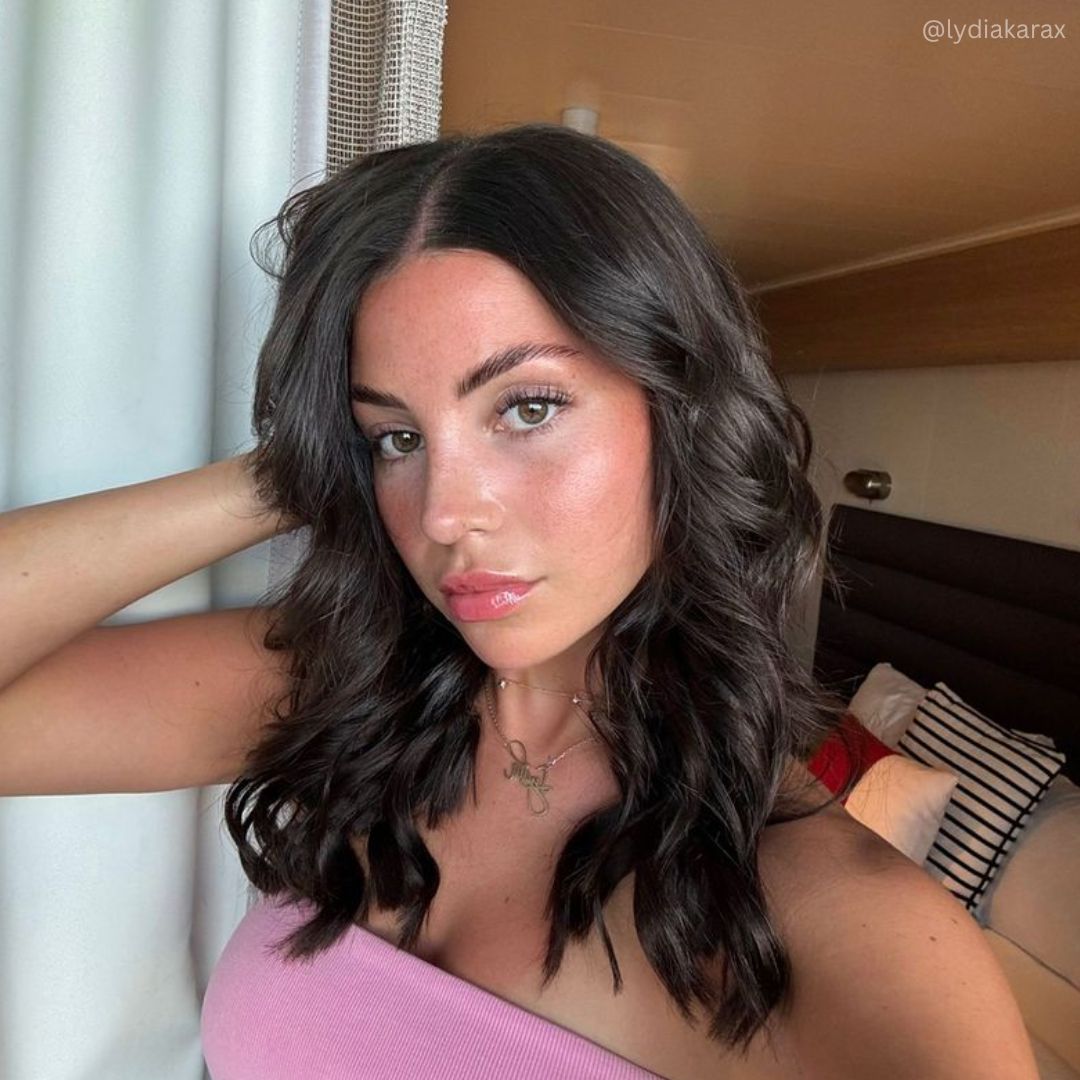How to Choose The Right Color Hair Extensions
by SHOPIFY API / JAN 10, 2020
Reading Time: 7 Minutes
Index
The secret to colour matching hair extensions, although it may seem like the obvious answer, is to perfectly match your natural hair colour with your shade of extensions. In order to choose the right hair extension colour, we’re pleased to share our versatile, luxurious range of 70+ shades, ranging from Jet Black to Ice Blonde and everything in between. However, you’ll have to consider a few other aspects, including your current hair colour, your skin tone, undertone, and any highlights you might have before you make your purchase!
So, to make your life a little easier we’ve put together How To Expertly Colour Match Hair Extensions – your ultimate guide to help you choose the best hair extension shade for you. You can also grab your very own natural hair extension colour match with our FREE Express Colour Match Service! Simply take a few photographs of your hair and roots from different angles and submit to our team of experts, and we’ll have your perfect match within a matter of hours! Want to know more? Read on to find out everything you need to know to achieve the hair colour of your dreams.
Get Free - Hair Extension Colour Match Online!
There is no need to think that buying hair extensions online is any more difficult than it is in person. In fact, there are plenty of tools out there that can make things easier – just look at our colour chart or our easy colour match service. All you need to do is send us a clear colour photo of yourself (head and shoulders) taken in natural lighting to show a true representation of your hair colour, and our experts will ensure you get the best match possible. You should receive a personalised colour recommendation within 24 hours.
What Hair Color Goes With My Skin Tone
A top tip for choosing the right colour of hair extensions is to match your hair to your skin tone. It is a mistake to assume that all shades will suit all skin types – for example, dramatic tones like platinum often complement paler tones, while darker tones tend to suit richer, warm colours or ombre styles, and lighter highlights.
Choosing Based on Warm or Cool Undertones
One of the easiest ways to determine your undertone is to base it on which jewellery suits your best. If you suit silver – your undertone is cool. If you suit gold – your undertone is warm. And if either, then it’s neutral. If you naturally have a very warm hair colour, and a fairly warm skin tone, you are likely to suit a wide range of different colours, though this doesn’t necessarily mean that paler tones shouldn’t experiment with vibrant tones.
Going for extremely dark hair, however, may make pale skin look even paler. If you have yellowish hues to your skin, dark reds and browns are usually flattering options.
Other things to consider may be the colour of clothes you wear. If you find that reds, oranges, golden yellow, olive green or rusty shades, you’ll suit warm tones such as golden blonde, golden brown, ginger blonde and auburn hair colours, while those who go for red, bright pink, royal blue, or green will suit cooler tones such as platinum, ash blonde, ash brown or jet black.
If reds, purples, charcoal greys and turquoises suit you, you’ll suit more neutral tones like sandy blonde, beige blonde, chocolate brown and mahogany.
Also check out our blog on "How to look Beautiful By Matching Your Clothes to Your Hair Colour"
Is it Important to Colour Match Hair Extensions To Your Roots
It is a misconception to assume that hair extensions need to match your own roots. This is not the case, and it will only make things much more difficult – natural roots change all the time, because they make up the newest hairs on your head.
As they grow and age, they get lighter and more brittle. Plus, the best way to wear extensions is as close as possible to your scalp, and your roots, anyway. You don’t want to end up sporting clip in hair extensions that look like they are about to fall off your head at any moment.
Colour Match Hair Extensions to Your Ends
If you are looking for a colour fairly close to your natural shade, the best way to locate a great colour match is to compare it with the lower sections of your locks. If the roots are the worst place for a comparison, then the ends are the best. If possible, isolate several strands of your natural hair, and trace the tone down from the mid-section to the tip. It is useful to pay attention to whether it changes colour a lot from root to tip.
Dyeing Your Human Hair Extensions
If you are planning to invest in top quality Remy extensions, which are made from 100% human hair, it is perfectly okay to dye the hair extensions to match your natural colour or get some funky colours. This is only an option for those using Remy human hair – dye will irreparably damage all other types of extension.
Although this is quite a labour-intensive option, it can be a handy way to fix colour-based blunders. While you can absolutely dye and colour your human hair extensions, you should always do strand test beforehand and note that it may shorten the lifespan of the hair.
So, which hair colour to go for?
Browns
Consider going brunette if your hair is currently mousy brown. This would be a minor change and would just give an extra dimension to your current hair colour.
This is also a good option if you want a low maintenance hair colour. Brown shades require little upkeep, and it’s an easy shade to achieve at home. If your hair is damaged, browns reflect well and hide split ends and breakages.
Shop our Brown Hair Extensions.
Red
If you have cool or pink skin you will pull off a darker cold red or purply red quite well. For anyone with golden or olive skin, a dark natural auburn or dark reddish brown would be good choice.
Bright vibrant reds and natural gingers suit pale skins, but it is important to match the shade to your undertone. A bright red can look striking on darker skins so if you have medium to dark hair, reds are an easy choice. For anyone considering going for red, it is important to remember the colour may fade quickly. If your hair is damaged.
Shop our red hair extensions.
Blonde
You should consider going blonde if you were blonde when you were young. Warmer skin tones suit a golden blonde better, and cool skin tones suit cold ashy tones best. If your undertone is neutral, you can potentially get away with any shade. Blonde shades often need regular maintenance – as roots will need to be touched up every four to eight weeks depending on how fast your hair grows.
Shop our Blonde Hair Extensions.
Black
If you have darker skin or olive skin, black works very well with darker tones. Black hair is the hardest shade to lift, so if you are also dying your natural hair, be certain that you want black hair. Add more length and thickness to your hair instantly with our black hair extensions.
Silver/white/ grey
Consider going silver/white if you have very pale skin with cool undertones. Silver with ashy blonde tones will neutralise the pink tones in your skin, while white, may accentuate your pinkness.
Shop our Silver & Grey Hair Extensions.
Still unsure which colour is your best match? Use our colour matching service and our team will do the rest.0
Conclusion:
Achieving a flawless, natural hair extension colour match can elevate your look and boost your confidence. When you choose the right hair extension colour, every strand blends seamlessly with your natural hair. Here at Cliphair, we make the colour-matching process easy, ensuring you find the best hair extension shade for an impeccable blend.
Say goodbye to guesswork and hello to accurate results that perfectly colour match hair extensions to your natural tones. Ready to simplify the process? Explore our express colour-matching service or browse our extensive colour collection to discover your perfect shade. Achieve the seamless, head-turning look you deserve!
FAQs
How do I choose the right colour for my hair extensions?
In order to choose the right coloured hair extensions, start by analysing the current shade and undertone of your natural hair. It's usually recommended to match the hair extensions to the ends of your hair rather than the roots, as this will create a more natural blend. Consider whether your hair colour has warm, cool, or neutral undertones to ensure consistency. Explore our hair extension colour match guide or reach out to our team of experts via our free express colour match service to get your own personalised results within a matter of hours!
What are the best methods for colour matching extensions to my hair?
There are several effective ways to ensure a perfect colour match. One popular approach is to order a sample or a swatch from the extension provider to compare directly with your natural hair. For those shopping online, some brands offer virtual consultations or tools to help you visualise the match. You may also compare multiple shades if you’re uncertain, as natural hair often contains multiple tones. If you’d prefer to colour match yourself at home, you can order your very own Colour Ring for a one-month loan, giving you all the time you need to explore your options and make those important hair decisions.
Can I blend different colours for a natural look?
Yes, blending different colours is an excellent way to achieve a natural, multi-dimensional appearance. Many people use a combination of shades, especially if they have highlights, lowlights, or an ombré effect in their natural hair. For a seamless blend, choose extensions in two or more complementary shades that reflect the variations in your natural hair. Mixing colours can add depth and realism, making the extensions look less uniform and more authentic. Creating a natural blend is easiest to achieve with professional extensions like nanos or tapes.
Are there professional services available for colour matching?
Yes, professional services are available for those who want a precise colour match. Many salons offer expert colour-matching consultations, where a stylist can assess your hair and recommend or even custom dye extensions to match your unique shade perfectly. Seeking professional advice is particularly beneficial if your hair colour is complex or difficult to match, that’s why we’re allowing you to explore our hair extension colour match guide or reach out to our team of experts via our free express colour match service to get your own personalised results within a matter of hours.
Looking for flawless, salon-worthy hair without breaking the bank? At Cliphair, we’ve got you covered with luxurious clip in hair extensions for quick transformations and permanent hair extensions for long-lasting glam. Extensions require special care and maintenance to preserve their quality, which is why we have all the top-notch hydrating haircare products needed to keep your style on point.
Need the perfect shade? Browse our full range of human hair extensions in over 70 rich, silky shades or check out our FREE Express Color Match Service to ensure a seamless blend every time.






